#polybius of megalopolis
Explore tagged Tumblr posts
Text

0 notes
Text
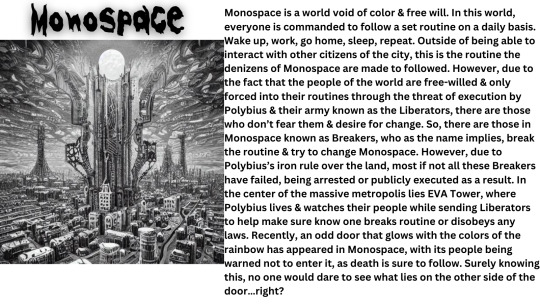

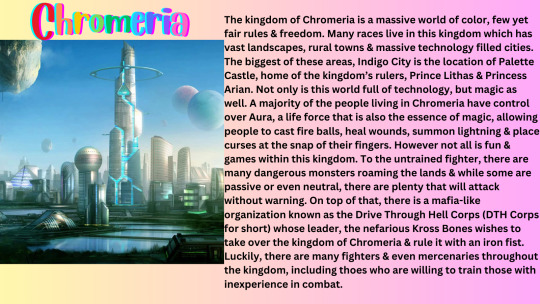

In the story of Forbidden Chroma, there are 2 worlds. Monospace, a world of order & routine & Chromeria, a kingdom of wonder & adventure. While in the story, Powder spends most of her time in Chromeria, Monospace is her true home. I designed both of these worlds to be parallels of each other, not in terms of dystopia vs. utopia like you may think as Chromeria is not a perfect land as in my eyes, nothing in the world is truly perfect. Anyways here is a semi-brief summary of inspirations of each world. Also note that the images are what I imagine each world to look like & are NOT the final designs of the worlds.
Monospace: As the the name implies, Monospace takes inspiration from White Space from OMORI, however unlike White Space which is nothing more than a bedroom, Monospace is a massive dystopian style city. At the center of this massive city lies EVA Tower which is the home of Monospace’s monarch Polybius who is the main antagonist of Forbidden Chroma. The tower itself was inspired by Megalo Tower, the giant tower where you battle Ultra Necrozma in Pokemon Ultra Sun & Ultra Moon. Also, Ultra Megalopolis is the inspiration behind Monospace being a city of sorts as even though Ultra Megalopolis can’t be explored & is just a glorified hallway to the Ultra Necrozma battle, it is still technically a city-like area in Ultra Space. As for the EVA part of the name, that is short for Evangelion as Polybius is an angel-like figure themself & their ultimate end goal also relates to Evangelion in a way but I don’t wanna say too much as I don’t wanna spoil my own story. The Liberators are Polybius’s soldiers & the police force of Monospace. While I don’t have a design for them yet, I want them to also be a mix of angelic & demonic in design while being nothing but mindless soldiers for their boss, basically a fusion between Stormtroopers & the Exorcist Army from Hazbin Hotel.
Chromeria: My idea for Chromeria is to make it a fusion between Hyrule & Remnant from RWBY while also adding some cyberpunk elements to the major 4 cities of the kingdom. All of the major locations are named after colors which fit since this is the land of color compared to the black & white Monospace. The wildlands are also full of monsters that I will try my best to make designs of & maybe show off in the future. These monsters range from, slimes, orcs, magically enhanced animals, demons & more. Chromeria is also the home of two important groups: the royals which include Prince Lithas & Princess Arian & the mafia group known as "Drive Through Hell" or DTH Corps, lead by Kross Bones. DTH Corps & Kross Bones act as a major antagonist but not one on the same threat level as Polybius. This group is basically a mafia group that also has the typical "take over the kingdom" scheme as Kross wishes to turn the orderly Chromeria into a kingdom of mass chaos.
That is as much as I'll say for now as I'm still working out additional details to the world building & lore. For now, let me know what you all think about what I've got so far. Also any characters mentioned in this post will be shown off in future Forbidden Chroma related posts.
1 note
·
View note
Text
Livy and Polybius - Forced Perspective
Throughout this course, we have mainly followed the history of Rome through the lens of Titus Livius (Livy) and the narrative he wove based on the sources he had collected during his life. While we as readers understand to not take everything written/ said at face value, even Livy pauses to input doubts of accounts from his sources, we generally trust that Livy’s narrative of history follows as closely as one can get while celebrating the ethics of Roman society the way a biased author would. It’s through the contrast of reading works of others such as Polybius that we obtain a more “objective” perspective of the Romans and their triumphs and defeats; the Battle of Lake Trasimene being the key example in this case.
In Livy’s work, The Battle of Lake Trasimene was a defeat that was inevitable for the Romans. The consul Flaminius was led by his nose by the genius Hannibal of the Carthaginians by his passion and his rash judgements. The battle itself was preluded by a history of a distrust the people had in the guidance of Flaminius, however when push came to shove, Flaminius was still able to lead an army by appealing to the hearts of his soldiers. Throughout Livy’s retelling of the battle, it is made clear that the Romans were placed at a huge disadvantage and were clearly bested in both encounters between the Carthaginians, yet Livy spins most of the tragic loss as a last stance effort or something of a heroic variety. Livy makes the tragedy apparent in the way he describes the people in Rome in the aftermath of the battle and loss and in conclusion. Livy teaches the lesson of not being rash trough the story of this Roman tragedy.
Polybius on the other hand takes a very different approach. He was Greek historian born from Megalopolis who is famous for his work, The Histories, and influenced historians in the Roman Republic beyond his life. While his influence took hold much later, his catalogue of history differs in the subjectivity of his descriptions of the Battle of Lake Trasimene. In book 3, Polybius pulls no punches and he writes about the Battle of Tasimene as a battle of minds between the Carthaginian’s Hannibal and Rome. He describes the tactics of the two combatants – Hannibal and Flaminius – and makes it clear that Hannibal’s success was due to his sheer talent and strategy (in a sense making Hannibal objectively a better protagonist to root for) and adds with his own input that the Romans defeat was clearly due to their lack of strategy and forethought. Polybius even describes the death of Flaminius in a much duller tone. Compared to Livy’s “last stand” with his men, Polybius says that he was killed and the body wasn’t able to be found after. Even the dramatic call for Rome to have a dictator for the first time in a long period was summed up in “the Romans elected a dictator” (to that effect.)
It becomes clear that when the objective of the authors is very important. Polybius writes in for politics, the facts, while Livy seeks to entertain. While many of the events overlapped between the two authors, the specified details and acts exemplified in each work showed how the innate bias and forced perspective imposed by each author can drastically narrow or widen the eyes of the reader. Context is the key to history, and the decision to write, omit, or down/over play something is the difference between Livy and Polybius.
1 note
·
View note
Text
Polybius and 'the Histories' on TFTH
Polybius and ‘the Histories’ on TFTH
This week on Two Friends Talk History, Zofia interviews Dr Elke Close about Polybius, an Achaean statesman, teacher, and historian from the Hellenistic period. Polybius was active in Megalopolis at the tail end of the period of Greek independence following the wars of the Hellenistic kings and the rise of the Roman empire. His surviving text, Histories, has provided scholars with unparalleled…

View On WordPress
0 notes
Text
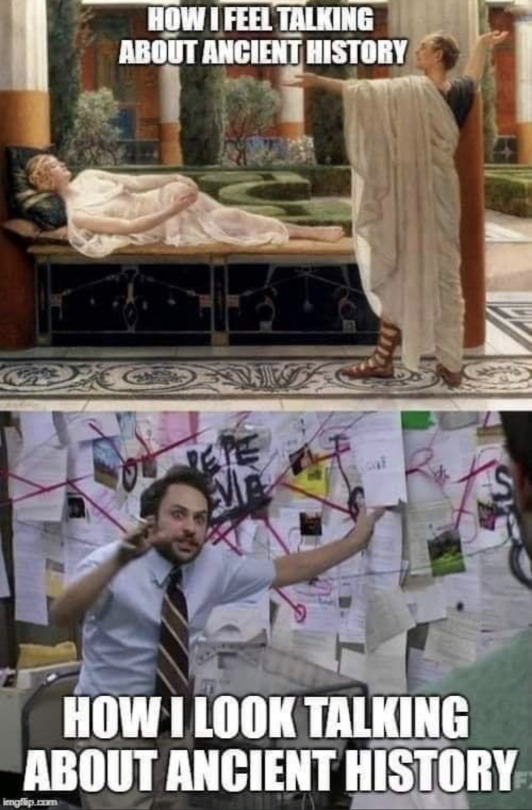
I see peoples eyes glaze over….
“From this I conclude that the best education for the situations of actual life consists of the experience we acquire from the study of serious history. For it is history alone which without causing us harm enables us to judge what is the best course in any situation or circumstance.”
Polybius of Megalopolis
11 notes
·
View notes
Text
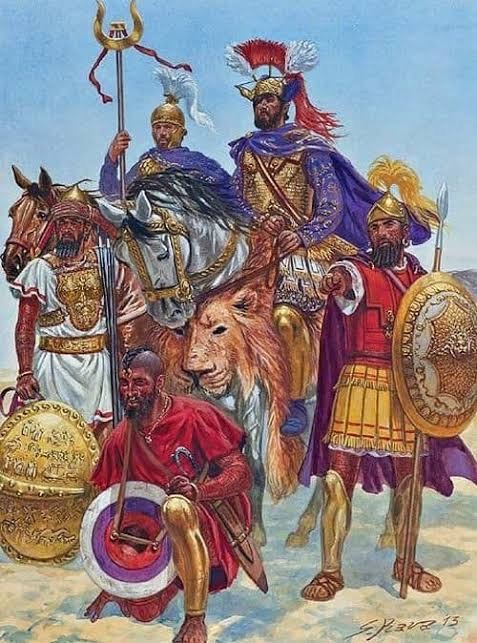




The First Act of the Mercenary Army in the Truceless War with Carthage.
“Throw!” For the Carthaginians being always accustomed to employ mercenary troops of miscellaneous nationalities, in securing that an army should consist of several different races, act wisely as far as the prevention of any rapid combinations for mutiny, or difficulty on the part of the commanders in overawing insubordination, are concerned: but the policy utterly breaks down when an outburst of anger, or popular delusion, or internal dissension, has actually occurred; for it makes it impossible for the commander to soothe excited feelings, to remove misapprehensions, or to show the ignorant their error. Armies in such a state are not usually content with mere human wickedness; they end by assuming the ferocity of wild beasts and the vindictiveness of insanity. This is just what happened in this case. There were in the army Iberians and Celts, men from Liguria and the Balearic Islands, and a considerable number of half-bred Greeks, mostly deserters and slaves; while the main body consisted of Libyans. Consequently it was impossible to collect and address them en masse, or to approach them with this view by any means whatever. There was no help for it: the general could not possibly know their several languages; and to make a speech four or five times on the same subject, by the mouths of several interpreters, was almost more impossible, if I may say so, than that. The only alternative was for him to address his entreaties and exhortations to the soldiers through their officers. And this Hanno continually endeavoured to do. But there was the same difficulty with them. Sometimes they failed to understand what he said: at others they received his words with expressions of approval to his face, and yet from error or malice reported them in a contrary sense to the common soldiers. The result was a general scene of uncertainty, mistrust, and misunderstanding. And to crown all, they took it into their heads that the Carthaginian government had a design in thus sending Hanno to them: that they purposely did not send the generals who were acquainted with the services they had rendered in Sicily, and who had been the authors of the promises made to them; but had sent the one man who had not been present at any of these transactions. Whether that were so or not, they finally broke off all negotiations with Hanno; conceived a violent mistrust of their several commanders; and in a furious outburst of anger with the Carthaginians started towards the city, and pitched their camp about a hundred and twenty stades from Carthage, at the town of Tunes, to the number of over twenty thousand. The men at once hurried to make a meeting; Spendius and Mathōs delivered violent invectives against Gesco and the Carthaginians; their words were received with every sign of approval; no one else could get a hearing; whoever did attempt to speak was promptly stoned to death, without the assembly so much as waiting to ascertain whether be intended to support the party of Spendius or no. A considerable number of privates as well as officers were killed in this manner in the various émeutes which took place; and from the constant repetition of this act of violence the whole army learnt the meaning of the word "throw," although there was not another word which was intelligible to them all in common. The most usual occasion for this to happen was when they collected in crowds flushed with wine after their midday meal. On such occasions, if only some one started the cry "throw," such volleys were poured in from every side, and with such rapidity, that it was impossible for any one to escape who once ventured to stand forward to address them. The result was that soon no one had the courage to offer them any counsel at all; and they accordingly appointed Mathōs and Spendius as their commanders.
#polybius of megalopolis#polybius histories#carthage#carthaginian mercenaries#truceless war#throw#languages#language barriers#humour#rome#roman#spqr
7 notes
·
View notes
Text
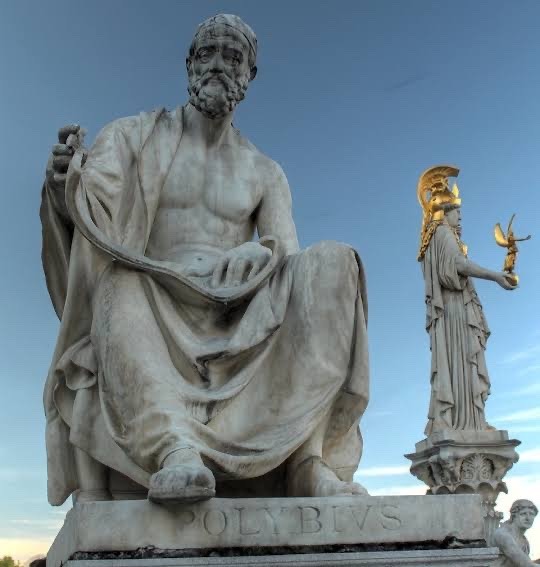
Polybius on the Romans
“For the mob, habituated to feed at the expense of others, and to have its hopes of a livelihood in the property of its neighbors, as soon as it has got a leader sufficiently ambitious and daring, being excluded by poverty from the sweets of civil honors, produces a reign of mere violence.” Polybius of Megalopolis
#quote#polybius of megalopolis#polybius#greek historian#ancient history#rome#roman#spqr#modern day politics#broken democracy#populism#mob rule#people have not changed in 2500yrs
4 notes
·
View notes
Text
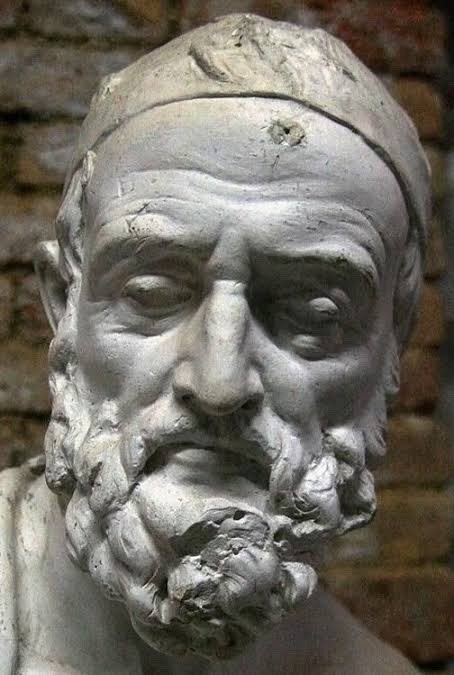
"So entirely unable are the majority of mankind to submit to the lightest of all burdens.... Silence."
Polybius of Megalopolis
0 notes